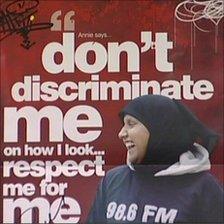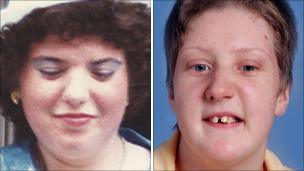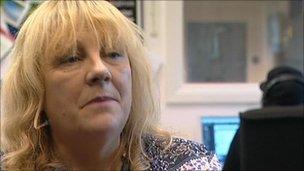Targeted for 'being different'
- Published
Five years after leaving Nigeria to escape homophobia and bullying, Aluya Ikhena found himself filling in a crime report after suffering abuse on a West Midlands bus.

Much of the work in Coventry aims at prevention
"These two guys followed me on to the bus and repeatedly shouted 'he's gay, he's gay' to everyone," he said.
"It was really intimidating. It felt like an attempt to bring me down and make me feel less of a person."
Mr Akhena, 34, said when the abuse happened two years ago he reported it to police because he had been deeply affected by a brutal attack in Nigeria and did not want to be victimised again for being gay.
"Walsall is a small town, everybody knows everybody and I did not want to feel that I could not go out or to fear where this could lead," he said.
Mr Akhena is attending the National Hate Crime Conference in Birmingham which will look at new ways of tackling crimes motivated by prejudice.
Thursday's event brought hate crime victims together with bodies such as the police, Crown Prosecution Service and community groups.
Maxi Hayles, chairman of Birmingham Racial Attacks Monitoring Unit (BRAMU), which organised the event, said hate crimes were on the rise and the economic climate and social deprivation would create more victims.
"With austerity the situation will get worse," he said. "With frontline services affected and people shivering about job losses - people will take out their grievances on others."
The conference aims to increase the number of hate crimes reported, bring more offenders to justice and fight hate crime on the internet.
Mr Akhena said he had also been targeted for being gay by other young black men while at a West Midlands college.
"At first I didn't realise I was being targeted because I was being called names I didn't recognise," he said.
"I think I was partly targeted because I do not conceal my personality and because I was studying beauty therapy."
Mr Akhena said the college took his complaint very seriously and he was supported through an anti-bullying forum.
"I think reporting it is saying that 'I am not going to let this happen again' - so it should be empowering," he said.
He said any persecution reminded him of when he ended up in hospital with a head injury and bruises all over his body after being beaten up at boarding school in Nigeria.
As a 16-year-old he was "left distraught" by the attack by a gang which first made him kneel down and covered him with water.

Fiona Pilkington (left) and her daughter Francecca Hardwick were abused by youths
BRAMU was set up by the Home Office in 1989 to tackle racism, but Mr Hayles said it had for some time helped victims of all forms or prejudice.
He said "more robust measures" were needed to combat hate crime and that the case of Fiona Pilkington demonstrated the need for new approaches.
Ms Pilkington, 38, from Leicestershire, killed herself and her disabled daughter in 2007 after suffering years of abuse from local youths.
Mr Hayles said: "We need a broader strategy and a wider vision to tackle the evils of hate crime."
He believes this could be achieved by different agencies sharing practices and resources and developing new ideas.
Some police forces did not collect hate crime data before 2008 but they now monitor it under five categories - race, religion or belief, disability, sexual orientation and transgender.
Macpherson report
The Association of Chief Police Officers (Acpo) will publish these figures on 30 November.
In Coventry, the problem is being tackled through a range of measures.
Alison Quigley became one of the first crime reduction officers in the country when she took up the city council post in 2004.

Alison Quigley often tells people about the impact of hate crime
She said some people struggled with the term hate crime but she felt it was an accurate description and allowed incidents to dealt with more seriously.
"It is really about hostility and hatred to somebody because of their difference," she said.
The number of incidents reported in the city has remained at roughly 500 a year, she added.
A lot of the work in Coventry is with young people who can now report bullying and crimes online and by text message.
And a lot of projects are aimed at prevention.
She explained how, as in many areas, victims of hate crime who did not want to go to police could contact "reporting centres".
Third party reporting centres were recommended by the Macpherson report into Stephen Lawrence's murder to tackle the under-reporting of hate crimes.
Ms Quigley said: "A lot of people just want it to stop and where it is reported to a social landlord, for example, the threat of eviction can be a powerful enough deterrent."
- Published14 November 2010
- Published7 October 2010